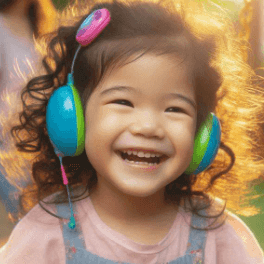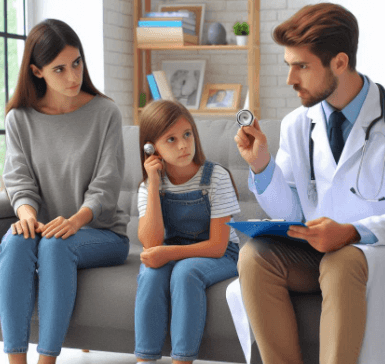Hey there and welcome to another hearing health article. Let’s break down hearing loss and autism to start things off.
When we talk about hearing loss, it means a reduced ability to hear sounds the same way as others. This could happen in one ear or both, and it might be mild or severe. Some folks are born with it, others develop it due to infections, diseases, or just getting older. And then there’s Autism Spectrum Disorder (ASD). This is a developmental disability that affects how people communicate and interact with others. You might notice early signs in social settings, language delays, or unusual behaviors and interests.
So, why are we talking about hearing loss and autism together? Is There A Link Between Hearing Loss And Autism?
Turns out, both conditions can exist in the same person. Some statistics show that hearing loss tends to be more common in people with autism than in the general population.
Imagine how tricky that can make things!
When you already find social interactions challenging, adding hearing difficulties could make it even more complex.
Recognizing the symptoms helps. For hearing loss, that might mean needing things repeated often, turning up the volume on devices a lot, or even seeming like you’re ignoring people when you’re not.
On the other hand, autism signs might include avoiding eye contact, having trouble with back-and-forth conversations, or getting upset by changes in routine. Knowing what to look for is key to understanding both issues.
So now you’ve got a basic rundown on what hearing loss and autism are, and you see why looking at both together matters. It’s about knowing they can overlap and seeing how that overlap might affect someone’s life.
Knowing the basics is just the first step to offering better support and understanding.
Exploring the Link: What Does Research Say?
So what’s the deal with hearing loss and autism? Do they link up, or is it just a coincidence?
Good question!

Researchers have been diving into this for quite a while like in the Autism Parenting magazine. Some studies show there’s a connection, while others aren’t so sure. What we do know is that both conditions can impact each other.
One interesting point is that there are overlapping symptoms. For instance, if someone with autism doesn’t respond to their name, it could be due to social challenges or hearing issues—or even both!
This makes diagnosis a bit more complicated and shows why it’s crucial to consider all angles.
There’s also some talk about shared genetic factors. Some scientists think that certain genes might play a role in both hearing loss and autism. While the research is still ongoing, it gives us a clue about potential biological links.
Then, there’s the whole sensory processing thing. Both hearing loss and autism affect how a person processes sensory information. If someone gets overwhelmed by noises or struggles with sensory input, it can make things like communication and learning even harder.
To sum it up, the connection between hearing loss and autism isn’t cut-and-dry, but there’s enough evidence to show that they can influence each other.
Understanding this link can lead to better support and interventions, making life a little bit easier for those who need it.
Recommended Reading: Is There A Link Between Hearing Loss and Dementia?
Impact on Communication and Social Skills
Communication is a big deal for everyone, right?
But when we’re talking about people with hearing loss and autism, it’s even more crucial. Each condition has its own set of communication challenges. Mix them, and things can get pretty complicated.
For those with hearing loss, basic communication can be tough. Imagine trying to keep up with conversations in a noisy room or catching every word in a fast-paced discussion.
Lip reading and using hearing aids help, but they’re not foolproof. Now, add autism into the mix.
People with autism often struggle with social cues, taking turns in conversation, and understanding nuances like sarcasm or idioms. When you throw hearing issues on top, it creates a whole new level of difficulty.
Social interaction is another big area where these challenges come into play. Picture a school setting where social cues are everywhere.
If a student can’t hear well, they might miss key parts of interactions, making it harder to fit in. If that same student is also navigating autism, the social scene can be daunting. They might have trouble making friends, understanding social norms, or participating in group activities.

There are families out there who deal with these dual challenges every day. Take, for instance, a teen with both autism and hearing loss who relies heavily on sign language.
They might find social interactions smoother when everyone around them knows sign language, too. Schools that offer specialized programs and communities that promote inclusive environments are lifesavers for these kids and their families.
Understanding the combined impact on communication and social skills helps you grasp just how tricky daily life can be. The good news is, that with the right support and a lot of patience, individuals with these dual challenges can still thrive. Awareness and understanding go a long way in making the world a friendlier place for everyone.
Diagnosis and Early Intervention
Getting a diagnosis early can make a world of difference for individuals with hearing loss and autism. The earlier you catch these conditions, the sooner you can start working on helpful strategies and interventions. But how do you figure out what’s going on?

For hearing loss, one go-to method is a hearing test. These tests can range from simple screenings for newborns to more detailed evaluations as kids grow older. Audiologists, the experts in hearing, can pinpoint the type and extent of hearing loss pretty accurately. If you suspect hearing loss, getting it checked out is worth it.
When it comes to diagnosing autism, things can get a bit trickier. It usually involves a team of specialists, including pediatricians, psychologists, and speech therapists. They might use a mix of observations, interviews, and standardized tests to understand a child’s development and behavior. Having a strong support system during this time can be incredibly helpful for both the individual and their family.
Once you have a diagnosis, there’s a whole range of intervention strategies.
For hearing loss, hearing aids, cochlear implants, and speech therapy can be game-changers. For autism, therapies like Applied Behavioral Analysis (ABA), occupational therapy, and social skills training make a big impact. Early intervention programs often combine these approaches to customize support based on individual needs.
Healthcare professionals play a crucial role here.
Audiologists, speech therapists, psychologists, and pediatricians can all provide valuable insights and support.
Don’t hesitate to reach out to these experts when navigating diagnosis and intervention. The goal is to create a network that will help the child to flourish and survive the outside world.
Support and Resources for Affected Individuals and Families
The journey of coping with hearing loss and autism doesn’t have to be a solo trip.
Tons of resources and support systems are out there to help individuals and families navigate these challenges. Knowing where to look can make everything a bit more manageable.

Educational resources can be a goldmine.
Schools often have special education programs tailored to assist students with hearing loss and autism. Individualized Education Plans (IEPs) can help by focusing on the student’s unique needs. These tools ensure that the educational journey is as smooth as possible. Teachers trained in special education can also provide one-on-one attention, making a huge difference in how kids experience school.
Organizations and community groups are another fantastic resource. Groups like the American Speech-Language-Hearing Association (ASHA) and Autism Speaks offer a wealth of information, support networks, and advocacy.
These organizations can guide you to local resources, support groups, and even financial assistance programs. Finding a community that’s been through similar experiences can be incredibly comforting and empowering.
On the practical side, there’s a lot of advice out there for families. Simple changes at home, like using visual aids and reducing background noise, can make communication easier.
Learning basic sign language or using communication apps can enhance interactions. Consistent routines and clear expectations help create a stable environment, which is especially beneficial for those dealing with autism.
Looking ahead, research continues to evolve. Scientists are always exploring new ways to support individuals with hearing loss and autism, aiming to improve their quality of life and develop more effective interventions.
So keep watching this space, as I learn new strategies and tools, I will have it here.
Remember, the path might be challenging, but you don’t have to walk it alone. Resources, support, and a caring community can make all the difference. Whether you’re a parent, a teacher, or someone living with these conditions, there’s always help and hope available.
And remember, if you want to chat about anything, or wish to share something, just leave your comment below.
Looking forward to hearing from you.
Regards
Roopesh

Wow, what a fantastic and insightful article! I never realized there could be such a deep connection between hearing loss and autism until reading this. It makes me wonder, do you think early intervention with hearing aids or other therapies could significantly improve the communication abilities of children on the autism spectrum? And what role does sensory overload play in this connection?
I’m also curious—how often do you think this link between hearing loss and autism gets overlooked by parents and healthcare professionals? It seems like something that should be discussed more openly.
Lastly, are there any particular success stories or case studies you’ve come across where addressing hearing loss has made a noticeable difference in someone’s autism diagnosis or treatment?
Thanks for sharing such valuable content!
Gabriel John
Thank you, Gabriel! I’m glad you found the article insightful. Early intervention with hearing aids or therapy can definitely help improve communication for children on the autism spectrum, especially when hearing loss is addressed early. Sensory overload plays a big role too, and treating auditory issues can help ease some of that burden.
As for how often this connection is overlooked, I do think it’s not discussed enough by healthcare professionals and parents. I’ve also seen some great case studies where addressing hearing loss has made a real difference in autism treatment.
Thanks again for your thoughtful comment!
4o